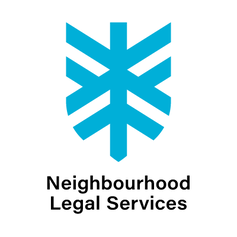|
Our Executive Director spoke with other community agency representatives from @StreetHealthTO, @TODropinNetwork, @SanctuaryTO at a press conference hosted by the Regent Park Community Health Centre on May 4th, to speak about the impact of #Covid19 on longstanding homeless, opioid and poverty crises. This was her statement: Thank you for having me. My name is Jennifer Stone and I am the Executive Director of Neighbourhood Legal Services, the community legal aid clinic for Toronto’s downtown east neighbourhoods. I direct my comments to all levels of government: Justin Trudeau, Doug Ford and Minister Todd Smith, and John Tory, because our recovery will require a whole of government response. The agencies here today come together to call on you to ensure the most vulnerable have meaningful income security during the COVID-19 pandemic and always. Many steps already taken have been progressive and positive, such as ensuring health care for all regardless of status, putting a moratorium on evictions, and getting quick emergency funding out to individuals and families. Thank you. Thank you for recognizing that when all else is laid bare, our basic economic and social rights are fundamental. We come together today to ask you to do more to establish income security in Ontario and across the country. This pandemic shines a light on the frailties of our system. As much as we hear that “we’re all in this together”, our neighbours do not all experience physical distancing, social isolation, and economic disruption in the same way. If you were living below the poverty line before the pandemic - such as those who rely on income support programs like Ontario Works, the Ontario Disability Support Program, or the Canada Pension Plan’s Disability Program - you are even worse off now. It goes without saying that ODSP and CPP-D recipients (and many OW recipients) live with disabilities and health conditions that make them particularly vulnerable to the Covid19 virus. To stay safe and physically distance costs money: supplemental services such as getting groceries at a food bank or using Internet at the libraries, are no longer available and must be found elsewhere - but how? Of the 75,000 workers in Ontario who supplement social assistance with part-time work, if they are eligible for the CERB (the Canada Emergency Response Benefit), they will experience claw-back to make them possibly worse off than before, once rent-geared-to-income recalculation takes place. As such we have the following three specific asks, which have been echoed by many including an open letter signed by over 130 organizations sent to you by our sister clinic the Income Security Advocacy Centre: 1. Raise the rates; 2. Eliminate loopholes and bureaucracy; 3. Don’t clawback Federal Benefits. 1. Raise the social assistance rates.
Current social assistance rates are far below the poverty line of $1767 per month, and are less than the cost of food and housing alone. In the past year, the rates were not increased to keep up with inflation and are insufficient for coping with additional needs during a pandemic. This contributes to food insecurity, poor health, and the current homelessness crisis – a recipe for disaster during COVID-19. Substantially raising the rates is a broad-reaching, transparent, and long-term solution. It is the right thing to do ensure that everyone is able to feed and clothe themselves and live with health and basic human dignity. 2. Expand eligibility for income support programs, and eliminate all sorts of bureaucracy, loopholes, and gaps People with precarious immigration status are often unable to access income support programs and must continue working in precarious employment which threatens everyone’s health and safety. We ask you to confirm that Ontario and Toronto will not communicate information about social assistance recipients to immigration authorities so that migrants can access benefits without fear of deportation. Also, although Ontario has made additional funds available for discretionary benefits, this is simply not enough and it requires social assistance recipients to individually request overworked caseworkers for a discretionary amount of additional funds to cover specific expenses like cleaning supplies. This experiences are unacceptable. Discretionary benefits are too uncertain, hard-to-access, and limited to be of any meaningful benefit to low-income Ontarians. Access to benefits and applications should be transparent, simple, and easy to access - now, in this time of crisis, and always. 3. Finally, exempt Federal Benefits from Clawback Earning exemptions for social assistance should be expanded. Currently, any income received from sources other than employment is generally deducted dollar-for-dollar from social assistance benefits. This prevents low income Ontarians from fully benefitting from Employment Insurance (EI). The Canada Emergency Response Benefit (CERB) is being treated like employment income and will be clawed back at 50 cents to each dollar after the first $200. We ask that these sources of income be fully exempt from clawback. Federal income support programs are meant to benefit all Canadians who are affected by a global pandemic. The Ontario government should not deprive low-income Ontarians from much-needed federal benefits. Clawing this money back blunts Canada’s effort to inject money into our struggling national economy and hurt those most vulnerable to the pandemic.
To conclude, real social and economic rights are the foundation on which we will recover and prosper. For the sake of all our health, everyone should have access to livable levels of income support, which should be delivered in a transparent and low-barrier way. No one should be left behind. Thank you.
0 Comments
Your comment will be posted after it is approved.
Leave a Reply. |
The NLS BlogOur blog shares information with our community on legal developments and other important issues. As such we hope you'll find this blog informative - and maybe even fun. Categories
All
|
Powered by
 Create your own unique website with customizable templates.
Create your own unique website with customizable templates.
 Create your own unique website with customizable templates.
Create your own unique website with customizable templates.

